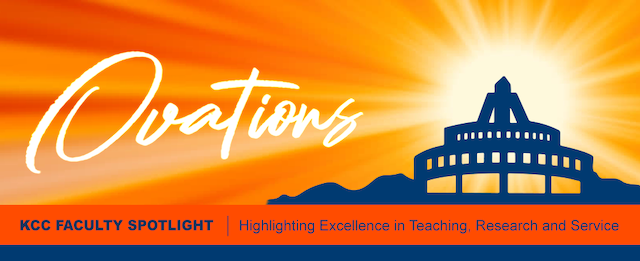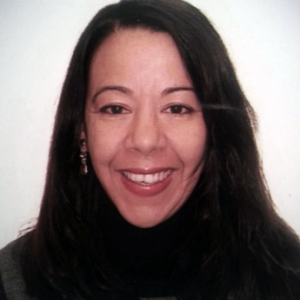Ovations


Dr. Christina Colon
Dr. Christina Colon, recently promoted to the rank of professor, has been actively teaching in Kingsborough’s Department of Biological Sciences since 2009. She climbed the ranks from assistant professor to associate professor, simultaneously making tenure. “It’s been a great progression,” she said. “A terrific journey.”
Dr. Colon is currently assistant director of CSTEP (Collegiate Science and Technology Entry Program). This five-year grant from the NYS Education Department funds undergraduate research opportunities for underserved students interested in careers in STEM (science, technology, engineering and math). Students are given stipends, resources, books, field trips and tutoring to help them pursue careers in allied health, medicine, science and more. Some students are paired with a mentor and undertake summer research, which they present at local and regional conferences each fall. These experiences are pivotal in their progression to acceptance into four-year schools, graduate programs and beyond. She has mentored over 40 summer research students. “Last week, my CSTEP student Shiva Jean-Baptiste won her second poster presentation award at MACUB (Metropolitan Association for College Undergraduate Biology) conference. The sheer enthusiasm these researchers bring to their presentations is what makes them shine like diamonds. This approach also allows research students to become mentors, colleagues and coauthors for publications.”
Colon has also served as faculty mentor of the Ecology Club, working with students to go on field trips. “We found many fun and interesting things to do, including eco-related museum visits, trips to the Central Park Zoo, Coney Island Aquarium, and even the Brooklyn Botanic Garden.”
Colon was also chair of the Eco Festival committee, which was cancelled due to COVID-19. “It was a three-day in-person campus-wide event including invited speakers and researchers from partner institutions around New York who gave hands-on mini seminars,” she said. “Students participated, earning civic engagement credits for contributing to solving problems in the community. “We were collaborating with the KCC Urban Farm and had an art exhibit at KAM one year that featured local artist and submissions from our yearly poster competition.”
A huge part of Dr. Colon’s work entails introducing students to the different techniques of field work, including methods of coyote tracking, shark tagging, seine netting, horseshoe crab monitoring and botanical analysis. Although currently deferred, plans are in the works for future field work that highlight the importance of ecological research, active learning and citizen science. She is pursuing funding to deploy acoustic detectors that can identify coyote howls with remarkable accuracy. This is a shift away from the current camera trapping protocols used by the Gotham Coyote team at AMNH, of which she is a part. These recordings and photographs can be analyzed and coded by students, even if they cannot go into the field. “In summer 2021, my colleagues helped me take photos of horseshoe crabs, which students can use to quantify the density and distribution of epibionts, at least until we are allowed to go back to in-person research,” she said.
“One of the things I try to do is open up dialogue. We don't want to preach to the students; we would rather they fully participate in their own education, get up and share their opinions and have a debate, have a discussion, have a dialogue, and share their views on the environment and ways to make a difference,” she said. “I learned a long time ago that you're not going to get anywhere by telling people what to think. But if you start asking them what they think, the conversation shifts, and interest becomes heightened and focused.”
Colon has observed that inclusiveness creates a healthier interaction in the classroom and with the environment, which benefits the overall ecosystem, and the individual. “I want to survive on this planet in a healthy way. So, from a selfish standpoint and for my own personal survival, how should I view other species? We need to shift the narrative from fear to wonder. The first time I took my ecology class to Plumb Beach to work on horseshoe crabs, they were grossed out by these creepy giant crabs with a dagger tail. Then I tell them the crab’s blood is used to produce a biomedical compound to test for bacterial contamination on medical equipment worldwide. Suddenly, they care about the crabs and go about rescuing as many as possible. This is what I try to teach; not just facts, but information that leads to actions.”
When asked about challenges faced, she feels that finding a careful balance between her teaching duties, her students, and her home life is of importance. “My untraditional pathway to academic success is to delegate to my students and give them leadership opportunities. Some professors who do research have traditionally hesitated to let students lead. But learning is about leading not following. I invited students to be peer mentors and even involve them in their own assessment and grading.”
She doesn’t consider her role at Kingsborough a job separate from her life. “As a kid, I had big aspirations. I wanted to work with animals, save the tigers and go be Dora the Explorer. Through a career in academia, I've been able to do that within the context of my position at Kingsborough.”
“I'm not just a professor teaching biology some of the time, then doing biology other times. I'm a professor who's teaching my students what it means to be a biologist. I'm moving away from the cookbook labs and predictable outcomes to giving my students the latitude to gather their own data as a class, test their own hypotheses and come up with their own research projects. I am giving them the guidance, but saying, this is your research. I’ve been taught to be the guide on the side, not the sage on the stage.”
Her latest challenge has been finding ways to make science translatable through the medium of virtual learning. “I'm not going say I've been more successful than others. But I can say that, as with all other aspects of teaching, I've enjoyed the challenge of trying to figure out how to make science come alive when students are in lockdown or isolated or unable to go to a lab.” Tools such as zooniverse.org and iNaturalist.org have helped her make virtual science real.
Colon sees herself as a professional scientist whose hobby is travel writing. She’s authored many Frommer’s guidebooks and quirkycruise.com articles and has traveled the world through her writing and research. “I continue to seek travel opportunities and prefer offbeat cruises, including a barge cruise in France, a tall ship in the Mediterranean and a windjammer in Penobscot Bay. Exploration through travel is a big part of my passion.”
When asked about her most and least favorite things about Kingsborough, she said, “I don’t like the commute! Coming from the Upper West Side of Manhattan makes the commute long. What I love about Kingsborough is that I have flexibility; I get to teach what, how and when I want, and I get to choose whether I teach in the summers and winters. Normally, I prefer to do research during these times. I get to study civets in Singapore, bears in Borneo, horseshoe crabs on the coast and coyotes in Central Park. How great is that?”
Congratulations, Dr. Colon, on your promotion!
